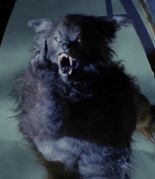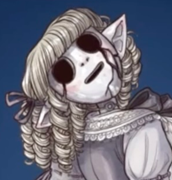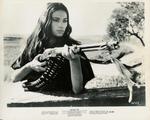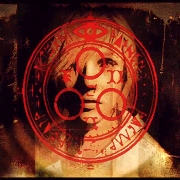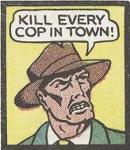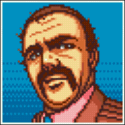|
Greetings Book Barn Goons! Sometimes a sentence pops. The words line up in just the right way that it lodges in your brain, stirs something inside, or makes you stop and think. This is the thread for those golden nuggets that you underline, highlight, or write down. The quote can be from fiction or non-fiction. It can be lyrical, funny, poignant, deep, silly, etc. This thread is for quotes that hold some kind of meaning. With that being said, let's try to keep away from an ironic perspective, or "I like it because it's so bad." This is The Book Barn, so discussion is encouraged. To help discussion, please list the author, and if you can, the book that the quote is from. This will (hopefully) keep the "Where is that quote from" posts to a minimum. You can always ask questions about the book if you like a quote and/or want a recommendation. Example of bad post: quote:"Call me Ishmael." It may be a famous quote, but not everyone has read the Harvard Classics. No book, no author. Also, it's such a well known quote, some people may find the post facetious. Example of good post: quote:"Call me Ishmael." We don't need a huge commentary for each quote, but it's always nice to know why it stood out to you. Reading is a personal journey, but you can still share that with others. Also, quotes don't have to be put in quote boxes, use them how you see fit. Let's try to keep the hate to a minimum. I didn't like Life of Pi, but I'm not going to shame someone else for quoting it or liking it. You shouldn't either. To get started: "Sometimes, just when we need them, life wraps metaphors up in little bows for us. When you think all is lost, the things you need the most return unexpectedly." -Brain On Fire: My Month of Madness by Susannah Cahalan Though I haven't gone through nearly the ordeal of Susannah Cahalan's mental breakdown, I've certainly felt that, when you're going through the worst, life provides little winks at you to remind you that there's still good, even with the bad. “But I knew the way the people in the town thought about things. They always had some time left over from their life to bother about other people and what they did. They thought they had to get together to help other people out, like the time they got together about the woman who let a colored man borrow her car and told her the best place for her was up north with all the other friend of the family lovers, and the time they got the veterans with overseas wives out. If you were different from anybody in town, you had to get out. That's why everybody was so much alike. The way they talked, what they did, what they liked, what they hated. If somebody got to hate something and he was the right person, everybody had to hate it too, or people began to hate the ones who didn't hate it. They used to tell us in school to think for yourself, but you couldn't do that in the town. You had to think what your father thought all his life, and that was what everybody thought.” - The Neon Bible by John Kennedy Toole JKT was mostly known for his comedy A Confederacy of Dunces, but he wrote his first novel when he was still a teenager, about growing up in a small town in the south. This quote succinctly captures the struggles of hate and hypocrisy of small town people. Happy Reading, Happy Posting.
|
|
|
|

|
| # ? Apr 30, 2024 21:26 |
|
"The book fascinated him, or more exactly it reassured him. In a sense it told him nothing that was new, but that was part of the attraction. It said what he would have said, if it had been possible for him to set his scattered thoughts in order. It was the product of a mind similar to his own, but enormously more powerful, more systematic, less fear-ridden. The best books, he perceived, are those that tell you what you know already." -1984, George Orwell When I first read this passage I almost threw the book across the room. Such an insanely simple idea but it blew my mind, it was the first time I had ever truly observed my own consciousness. "Some people never observe anything. Life just happens to them. They get by on little more than a kind of dumb persistence, and they resist with anger and resentment anything that might lift them out of that false serenity." -Dune, Frank Herbert "There is probably no more terrible instance of enlightenment than the one in which you discover your father is a man — with human flesh." -Dune, Frank Herbert I just finished reading "Dune" for the first time and the book lived up to all the hype++ I think I probably ended up reading the book twice, going back to re-read a chapter or few pages to experience the nuance and beauty of the story again and again. That being said, there are too many good quotes that caught me in a moment of awe...I feel as though I read this book at the absolute perfect time in my life as I wouldn't have appreciated the political, religious, philosphical, and psychological genius in my early twenties. “The primary cause of unhappiness is never the situation but your thoughts about it.” -A New Earth: Awakening Your Life's Purpose, Eckart Tolle “Anything that you resent and strongly react to in another is also in you.” -A New Earth: Awakening Your Life's Purpose, Eckart Tolle "The ego isn't wrong; it's just unconscious. When you observe the ego in yourself, you are beginning to go beyond it. Don't take the ego too seriously. When you detect egoic behavior in yourself, smile. At times you may even laugh. How could humanity have been taken in by this for so long? Above all, know that the ego isn't personal. It isn't who you are. If you consider the ego to be your personal problem, that's just more ego." -A New Earth: Awakening Your Life's Purpose, Eckart Tolle I can't recommend this book enough, truly a life altering experience. I feel like this book was an operator's manual to my own mind. I didn't appreciate much his comments on eastern medicine as a potential alternative to treating infectious disease, but all other psychological analysis of human consciousness I found to be incredible insightful. fruition fucked around with this message at 21:06 on Jul 11, 2015 |
|
|
|
"Social scientists have written papers analyzing Eshelman's every move in there, including the strange detail that the more brutally he behaved, the more American South his accent sounded. I saw at least one analysis of the experiment where the author seemed to find it perfectly plausible that if a person was overcome by a violent madness he'd involuntarily start to sound like someone from Louisiana." On Philip Zimbardo's famous Stanford Prison Experiment -Jon Ronson, So You've Been Publicly Shamed
|
|
|
|
"West of Arkham the hills rise wild, and there are valleys with deep woods that no axe has ever cut. There are dark narrow glens where the trees slope fantastically, and where thin brooklets trickle without ever having caught the glint of sunlight. On the gentle slopes there are farms, ancient and rocky, with squat, moss-coated cottages brooding eternally over old New England secrets in the lee of great ledges; but these are all vacant now, the wide chimneys crumbling and the shingled sides bulging perilously beneath low gambrel roofs." - The Color Out of Space, HP Lovecraft Lovecraft gets a lot of poo poo for the "unnamable eldritch crawling madness" stuff, probably because it's so easy (and fun) to parody, but he was a lot more sparing with it than his reputation suggests. Particularly once he got really good in 1927 or so, he only let it off the chain when the story demanded it, because the narrative, or the narrator, or both, were collapsing into utter insanity. For the most part he was a lot more restrained and detached, as with this, the opening to probably his best story. I don't think there's a word out of place here--there are quite a few adjectives of course, but nothing you wouldn't see in an unremarkable travel journal of the time, and they all work to paint a vivid picture. Lovecraft was terrific at describing landscapes and architecture (looking at buildings was about the only thing that got him out of the house), I don't think he gets enough credit for that. I could probably have cut this down to the first seven words; it's a perfectly balanced phrase and it gets my imagination going like nothing else.
|
|
|
|
|
"Eff! What are you doing?" "Killing bugs," I said. I couldn't explain more without losing my concentration. -The Thirteenth Child, Patricia C. Wrede This line takes place in the climax of the book, where Eff finds a way to kill the Mirror Bugs that were destroying the settlements and saves the day, in the climax of the tale. I admit that most of my enjoyment for the scene comes from the audiobook, but Amanda Ronconi knocks that line out of the park. She just sounds half-sheepish, half-distracted while standing in a pile of Bug Corpses.
|
|
|
|
Note: if you have not read the Mistborn series, and there is the slightest chance that you will, please don't read the spoilered parts! You will RUIN what is, in my opinion, one of the coolest surprises in the series for yourself. "...for he must not be allowed to release the thing that is imprisoned there." Brandon Sanderson, Mistborn: The Well of Ascension I love this line. I could probably put any line from a Sanderson Avalanche here, but this one is such a succinct summation of the Avalanche for the book, I still get chills when rereading the series. For those who haven't read anything by him, Brandon Sanderson's writing has two defining characteristics. First, his magic systems are all various levels of great. Second is the Sanderson Avalanche; the man spends the first three quarters or more of a book setting the reader up - characters doing little things that seem at the time to be kind of random, maybe as simple characterization, other characters who seem to have little to no purpose, etc - and then the last bit of the book is spent rapidly tying off every loose thread, including the ones you didn't even notice until you saw how they played out. In this case, the quote comes from the header of the last pre-epilogue chapter. All of them have the headers, which actually tell a story all their own. Specifically, they're what one of the main characters finds engraved into a sheet of metal. The inscription starts, roughly, "I pound these words into steel, for anything not set in metal cannot be trusted." The character is short on time, so rather than read the whole thing right then, he takes a rubbing of the inscription for later study. However, something happens to change the words on the rubbing, which directly leads to everything going straight to hell by the third book in the trilogy. The fact that the second to last chapter is the first time the reader gets the unadulterated version of that bit just adds to the "oh poo poo" factor. Sorry for the mass of spoilers, but I did want to explain why I picked that one.
|
|
|
|
"A few days ago you and your mother came home with flowers. I knew where you had been. Of course she takes you up there, to get you a little used to the place. And I hear she’s made it very pretty, too. She’s a thoughtful woman. You had honeysuckle, and you showed me how to suck the nectar out of the blossoms. You would bite the little tip off a flower and then hand it to me, and I pretended I didn’t know how to go about it, and I would put the whole flower in my mouth, and pretend to chew it and swallow it, or I’d act as if it were a little whistle and try to blow through it, and you’d laugh and laugh and say, No! no! no!! And then I pretended I had a bee buzzing around in my mouth, and you said, “No, you don’t, there wasn’t any bee!” and I grabbed you around the shoulders and blew into your ear and you jumped up as though you thought maybe there was a bee after all, and you laughed, and then you got serious and you said, “I want you to do this And then you put your hand on my cheek and touched the flower to my lips, so gently and carefully, and said, “Now sip You said, “You have to take your medicine So I did, and it tasted exactly like honeysuckle, just the way it did when I was your age and it seemed to grow on every fence post and porch railing in creation. I was struck by the way the light felt that afternoon. I have paid a good deal of attention to light, but no one could begin to do it justice. There was the feeling of a weight of light—pressing the damp out of the grass and pressing the smell of sour old sap out of the boards on the porch floor and burdening even the trees a little as a late snow would do. It was the kind of light that rests on your shoulders the way a cat lies on your lap. So familiar. Old Soapy was lying in the sun, plastered to the sidewalk. You remember Soapy. I don’t really know why you should. She is a very unremarkable animal. I’ll take a picture of her. So there we were, sipping honeysuckle till suppertime, and your mother brought out the camera, so maybe you will have some pictures. The film ran out before I could get a shot of her. That’s just typical. Sometimes if I try to photograph her she’ll hide her face in her hands, or she’ll just walk out of the room. She doesn’t think she’s a pretty woman. I don’t know where she got these ideas about herself, and I don’t think I ever will know, either. Sometimes I’ve wondered why she’d marry an old man like me, a fine, vital woman like she is. I’d never have thought to ask her to marry me. I would never have dared to. It was her idea. I remind myself of that often. She reminds me of it, too. I’d never have believed I’d see a wife of mine doting on a child of mine. It still amazes me every time I think of it. I’m writing this in part to tell you that if you ever wonder what you’ve done in your life, and everyone does wonder sooner or later, you have been God’s grace to me, a miracle, something more than a miracle. You may not remember me very well at all, and it may seem to you to be no great thing to have been the good child of an old man in a shabby little town you will no doubt leave behind. If only I had the words to tell you." -Marilyn Robinson, Gilead That thing won the Pulitzer for a drat good reason.
|
|
|
|
quote:The two men lay down, without undressing, upon their beds of soft balsam boughs, cunningly arranged. Inside, all was warm and cozy, but outside the world of crowding trees pressed close about them, marshalling their million shadows, and smothering the little tent that stood there like a wee white shell facing the ocean of tremendous forest. - Algernon Blackwood, "The Wendigo" Blackwood does the best job I've seen of conveying how helpless and small the wilderness can make you feel. This story in particular is probably the best weird tale I've ever read, or close to it. MeatwadIsGod fucked around with this message at 05:11 on Aug 14, 2015 |
|
|
|
Another great quote about wilderness: "But it seemed that I had seen the ancient afternoon of that trail, from meadow rocks and lupine posies, to sudden revisits with the roaring stream with its splashed snag bridges and undersea greennesses, there was something inexpressibly broken in my heart as though I’d lived before and walked with a fellow bodhisattva, but maybe on a more important journey. I felt like lying down by the side of the trail and remembering it all. The woods do that to you, they always look familiar, long lost, like the face of a long-dead relative, like an old dream, like a piece of forgotten song drifting across the water, most of all the living and the dying and the heartbreak that went on a million years ago and the clouds as they pass overhead seem to testify (by their own lonesome familiarity) to this feeling. Ecstasy, even, I felt, with flashes of sudden remembrance, and feeling sweaty and drowsy I felt like sleeping and dreaming in the grass." -Jack Kerouac, The Dharma Bums I like Kerouac, I appreciate his contribution to American Lit. The Dharma Bums shows that just because you're on a path to enlightenment doesn't mean you're automatically a good person, and Kerouac was honest about his flawed characters (even if it were unintentional). However, the best parts of the book are the moments where Ray and Japhy wander the wilderness. This is from the first section where they climb the mountain for the first time. Moments like this quote really hit home, because it's happened to me. You wander the woods and this weird moment grows where you feel the weight of everything around you and you just want to soak it in. I wish I could quote the entirety of Chapter 29 of this book, as it is full of these moments.
|
|
|
|
“The next person who tells me something like, "Squiggle-gently caress the rightwise cock-swatter with a starboard jib," is going to get a knife to the throat.” -- Scott Lynch Red Seas Under Red Skies The lead character in the Gentlemen Bastards series is Locke Lamora and he's a wisecracking smartass. While there are hundreds of quotes of his that stick out to me, this one was the one that actually made me stop reading while I laughed.
|
|
|
|
"In five years the penis will become obsolete". --- John Varley - Steel Beach
|
|
|
|
"When people come to speak to me, whatever they say, I am struck by a kind of incandescence in them, the “I” whose predicate can be “love” or “fear” or “want,” and whose object can be “someone” or “nothing” and it won’t really matter, because the loveliness is just in that presence, shaped around “I” like a flame on a wick, emanating itself in grief and guilt and joy and whatever else." -Marilynne Robinson, Gilead
|
|
|
|
"Well, I'm back", he said. - the last line of The Lord of the Rings. I don't care for his writing style for it but that line is the perfect way for Tolkien to have ended the book.
|
|
|
|
"If anyone wants to pray for him, now's the time." -Hellblazer: Rake at the Gates of Hell By Garth Ennis and Steve Dillon The first line in the comic book story arc, presented in a caption box on an all black page. I don't think there's been an opening line that's ever filled me with such dread before.
|
|
|
|
Even now, so many years later, all this is somehow a very evil memory. I have many evil memories now, but ... hadn't I better end my "Notes" here? I believe I made a mistake in beginning to write them, anyway I have felt ashamed all the time I've been writing this story; so it's hardly literature so much as a corrective punishment. Why, to tell long stories, showing how I have spoiled my life through morally rotting in my corner, through lack of fitting environment, through divorce from real life, and rankling spite in my underground world, would certainly not be interesting; a novel needs a hero, and all the traits for an anti-hero are EXPRESSLY gathered together here, and what matters most, it all produces an unpleasant impression, for we are all divorced from life, we are all cripples, every one of us, more or less. We are so divorced from it that we feel at once a sort of loathing for real life, and so cannot bear to be reminded of it. Why, we have come almost to looking upon real life as an effort, almost as hard work, and we are all privately agreed that it is better in books. And why do we fuss and fume sometimes? Why are we perverse and ask for something else? We don't know what ourselves. It would be the worse for us if our petulant prayers were answered. Come, try, give any one of us, for instance, a little more independence, untie our hands, widen the spheres of our activity, relax the control and we ... yes, I assure you ... we should be begging to be under control again at once. I know that you will very likely be angry with me for that, and will begin shouting and stamping. Speak for yourself, you will say, and for your miseries in your underground holes, and don't dare to say all of us-- excuse me, gentlemen, I am not justifying myself with that "all of us." As for what concerns me in particular I have only in my life carried to an extreme what you have not dared to carry halfway, and what's more, you have taken your cowardice for good sense, and have found comfort in deceiving yourselves. So that perhaps, after all, there is more life in me than in you. Look into it more carefully! Why, we don't even know what living means now, what it is, and what it is called? Leave us alone without books and we shall be lost and in confusion at once. We shall not know what to join on to, what to cling to, what to love and what to hate, what to respect and what to despise. We are oppressed at being men--men with a real individual body and blood, we are ashamed of it, we think it a disgrace and try to contrive to be some sort of impossible generalised man. We are stillborn, and for generations past have been begotten, not by living fathers, and that suits us better and better. We are developing a taste for it. Soon we shall contrive to be born somehow from an idea. But enough; I don't want to write more from "Underground." -Fyodor Dostoevsky, Notes From Underground
|
|
|
|
He saw very clearly how all his life led only to this moment and all after led nowhere at all. He felt something cold and soulless enter him like another being and he imagined that it smiled malignly and he had no reason to believe that it would ever leave. - Cormac McCarthy, All the Pretty Horses The arrival of an utter, life altering devastation, in so many words.
|
|
|
|
“First of all, love is a joint experience between two persons — but the fact that it is a joint experience does not mean that it is a similar experience to the two people involved. There are the lover and the beloved, but these two come from different countries. Often the beloved is only a stimulus for all the stored-up love which had lain quiet within the lover for a long time hitherto. And somehow every lover knows this. He feels in his soul that his love is a solitary thing. He comes to know a new, strange loneliness and it is this knowledge which makes him suffer. So there is only one thing for the lover to do. He must house his love within himself as best he can; he must create for himself a whole new inward world — a world intense and strange, complete in himself. Let it be added here that this lover about whom we speak need not necessarily be a young man saving for a wedding ring — this lover can be man, woman, child, or indeed any human creature on this earth. Now, the beloved can also be of any description. The most outlandish people can be the stimulus for love. A man may be a doddering great-grandfather and still love only a strange girl he saw in the streets of Cheehaw one afternoon two decades past. The preacher may love a fallen woman. The beloved may be treacherous, greasy-headed, and given to evil habits. Yes, and the lover may see this as clearly as anyone else — but that does not affect the evolution of his love one whit. A most mediocre person can be the object of a love which is wild, extravagant, and beautiful as the poison lilies of the swamp. A good man may be the stimulus for a love both violent and debased, or a jabbering madman may bring about in the soul of someone a tender and simple idyll. Therefore, the value and quality of any love is determined solely by the lover himself. It is for this reason that most of us would rather love than be loved. Almost everyone wants to be the lover. And the curt truth is that, in a deep secret way, the state of being beloved is intolerable to many. The beloved fears and hates the lover, and with the best of reasons. For the lover is forever trying to strip bare his beloved. The lover craves any possible relation with the beloved, even if this experience can cause him only pain.” -Carson McCullers, The Ballad of the Sad Cafe "It is music that causes the heart to broaden and the listener to grow cold with ecstasy and fright.” -Carson McCullers, The Ballad of the Sad Cafe Such a sad, bizarre, dark story of romance. If you haven't read it, you're doing yourself a disservice.
|
|
|
|
From Life and Fate by Vasily Grossman:quote:“Yes, of course. What saves people when their bovine melancholy, their mute fatalism yields to a piercing sense of horror – what saves people then is the opium of optimism.” Probably the most profound book I've ever read, and also one of the longest and densest. I read it twice, both times in Iraq because I had far less distractions there, and because reading it there made it that much more profound. I don't think anyone I've recommended it to has actually read it though.
|
|
|
|
The Rat posted:From Life and Fate by Vasily Grossman: I've only read Writer at War but I'm gonna pick that up right now.
|
|
|
|
Yay I did a good thing today! 
|
|
|
|
"On turning into the walk, he saw M. Leblanc and the young girl at the other end, "on their bench." He buttoned his coat up to the very top, pulled it down on his body so that there might be no wrinkles, examined, with a certain complaisance, the lustrous gleams of his trousers, and marched on the bench. This march savored of an attack, and certainly of a desire for conquest. So I say that he marched on the bench, as I should say: 'Hannibal marched on Rome.'" Les Miserables by Victor Hugo. I love this line so much because, while Hugo's prose can be a bit too purple for some people's taste, he manages to create some moments that one can relate to and are surprisingly funny.
|
|
|

|
|
|
|
|
Book and Author?
|
|
|
|
One of my favorite authors is Guy Gavriel Kay, who writes low-magic fantasy set in countries and time periods analogous to our own history. His prose is incredible, so here's only a few of the best parts from some of his books. I recommend his Sarantine Mosaic duology, which is set in a meticulously researched fantasy Byzantium and pulls a lot from W.B. Yeats' Sailing to Byzantium. They deal with politics, art, religious upheaval, death, and the ending of old worlds. There is a rustling sound. A lean cleric of the Path, an alchemist, appears beside the throne bearing a jade and jewelled cup upon a round golden tray. The emperor, his eyes never leaving the dancer, whose eyes never leave his, drinks the elixir prescribed him for this hour. She will take hers later. He might never need his tomb. He might live with her forever, eating golden peaches in pavilions of sandalwood, surrounded by tended lacquer trees and bamboo groves, gardens of chrysanthemums beside ponds with lilies and lotus flowers floating in them, drifting amid lanterns and fireflies like memories of mortality. - 'Under Heaven' Duty, assuming all tasks, can betray arrogance. The idea we can know what must be done, and do it properly. We cannot know the future, my friend. It claims so much to imagine we can. And the world is not broken any more than it always, always is. - 'Under Heaven' The world is not something to be understood. It is vanity, illusion to even try. - 'Under Heaven' “We will pick our way through the shards of broken objects that folly leaves behind. And some of what breaks will be very beautiful.” - 'Under Heaven' Branching paths. The turning of days and seasons and years. Life offered you love sometimes, sorrow often. If you were very fortunate, true friendship. Sometimes war came. You did what you could to shape your own peace, before you crossed over to the night and left the world behind, as all men did, to be forgotten or remembered, as time or love allowed. - 'Under Heaven' Eventually, morning came. Morning always comes. There are always losses in the night, a price paid for light. - 'Lord of Emperors: Book Two of the Sarantine Mosaic' Behind them in the night streets of the City, flames appeared and disappeared as they always did, seen or unseen, unlit by any taper or spark, unfathomable as the moonlit sea or the desires of men and women between their birth and dying. - 'Lord of Emperors: Book Two of the Sarantine Mosaic' - Another historical fiction novel I loved was Madeline Miller's The Song of Achilles, which is a retelling of the Iliad from Patroclus' point of view. It was heartwrenching and wonderfully written. Had she really thought I would not know him? I could recognize him by touch alone, by smell; I would know him blind, by the way his breaths came and his feet struck the earth. I would know him in death, at the end of the world. I knew he spoke not of his death, but of the nightmare Odysseus had spun, the loss of his brilliance, the withering of his grace. I had seen the joy he took in his own skill, the roaring vitality that was always just beneath the surface. Who was he if not miraculous and radiant? Who was he if not destined for fame? “I would not care,” I said. The words scrabbled from my mouth. “Whatever you became. It would not matter to me. We would be together.” “I know,” he said quietly, but did not look at me. He knew, but it was not enough. The sorrow was so large it threatened to tear through my skin. When he died, all things swift and beautiful and bright would be buried with him. I opened my mouth, but it was too late. “I will go,” he said. “I will go to Troy.” The rosy gleam of his lip, the fevered green of his eyes. There was not a line anywhere on his face, nothing creased or graying; all crisp. He was spring, golden and bright. Envious Death would drink his blood, and grow young again. He was watching me, his eyes as deep as earth. “Will you come with me?” he asked. The never-ending ache of love and sorrow. Perhaps in some other life I could have refused, could have torn my hair and screamed, and made him face his choice alone. But not in this one. He would sail to Troy and I would follow, even into death. “Yes,” I whispered. “Yes.” Peleus stood at the shore’s edge, one hand raised in farewell. True to his word, Achilles had not told him of the prophecy, merely hugged him tightly, as if to soak the old man into his skin. I had embraced him too, those thin, wiry limbs. I thought, This is what Achilles will feel like when he is old. And then I remembered: he will never be old. Overhead, the stars were veiled. I could feel the air’s heaviness. There would be a storm tonight. The rain would be soaking, filling up the earth till she burst her seams. It would gush down from the mountaintops, gathering strength to sweep away what stood in its path: animals and houses and men. He is such a flood, I thought. The memories come, and come. She listens, staring into the grain of the stone. We are all there, goddess and mortal and the boy who was both. The sun is setting over the sea, spilling its colors on the water’s surface. She is beside me, silent in the blurry, creeping dusk. Her face is as unmarked as the first day I saw her. Her arms are crossed over her chest, as if to hold some thought to herself. I have told her all. I have spared nothing, of any of us. We watch the light sink into the grave of the western sky. “I could not make him a god,” she says. Her jagged voice, rich with grief. But you made him.
|
|
|
|
This is from the very end of Solaris by Sanislaw Lem, so I'll put it in spoiler tags Must I go on living here then, among the objects we both had touched, in the air she had breathed? In the name of what? In the hope of her return? I hoped for nothing. And yet I lived in expectation. Since she had gone, that was all that remained. I did not know what achievements, what mockery, even what tortures still awaited me. I knew nothing, and I persisted in the faith that the time of cruel miracles was not past
|
|
|
|
Broken men are more deserving of our pity, though they may be just as dangerous. Almost all are common-born, simple folk who had never been more than a mile from the house where they were born until the day some lord came round to take them off to war. Poorly shod and poorly clad, they march away beneath his banners, ofttimes with no better arms than a sickle or a sharpened hoe, or a maul they made themselves by lashing a stone to a stick with strips of hide. Brothers march with brothers, sons with fathers, friends with friends. They've heard the songs and stories, so they go off with eager hearts, dreaming of the wonders they will see, of the wealth and glory they will win. War seems a fine adventure, the greatest most of them will ever know. "Then they get a taste of battle. "For some, that one taste is enough to break them. Others go on for years, until they lose count of all the battles they have fought in, but even a man who has survived a hundred fights can break in his hundred-and-first. Brothers watch their brothers die, fathers lose their sons, friends see their friends trying to hold their entrails in after they've been gutted by an axe. "They see the lord who led them there cut down, and some other lord shouts that they are his now. They take a wound, and when that's still half-healed they take another. There is never enough to eat, their shoes fall to pieces from the marching, their clothes are torn and rotting, and half of them are making GBS threads in their breeches from drinking bad water. "If they want new boots or a warmer cloak or maybe a rusted iron halfhelm, they need to take them from a corpse, and before long they are stealing from the living too, from the smallfolk whose lands they're fighting in, men very like the men they used to be. They slaughter their sheep and steal their chicken's, and from there it's just a short step to carrying off their daughters too. And one day they look around and realize all their friends and kin are gone, that they are fighting beside strangers beneath a banner that they hardly recognize. They don't know where they are or how to get back home and the lord they're fighting for does not know their names, yet here he comes, shouting for them to form up, to make a line with their spears and scythes and sharpened hoes, to stand their ground. And the knights come down on them, faceless men clad all in steel, and the iron thunder of their charge seems to fill the world... "And the man breaks. A Feast For Crows Its not often fantasy books talks about how lovely those epic battles must've been for the soldier watching those orks appear in the horizon and its not often you see G.R.R. Martin write this well. Alhazred fucked around with this message at 19:31 on Aug 24, 2015 |
|
|
|
|
I read a lot of utter trash in the Science Fiction and Fantasy ghetto but every now and then it produces some utterly fantastic lines. The real unforgivable acts are committed by calm men in beautiful green silk rooms, who deal death wholesale, by the shipload, without lust, without anger, or desire, or any redeeming emotion to excuse them but cold fear of some pretended future. But the crimes they hope to prevent in that future are imaginary. The ones they commit in the present - they are real. Shards of Honor, Lois McMaster Bujold One of the lead characters talking about what he considers to be the worst form of crimes. It's a lot more poignant in context when you realise he considers himself to have been one of those calm men and he hates himself for it. Vimes climbed back up the barricade. The city beyond was dark again, with only the occasional chink of light from a shuttered window. By comparison, the streets of the Republic were ablaze. In a few hours, the shops out there were expecting deliveries, and they weren’t going to arrive. The government couldn’t sit this one out. A city like Ankh-Morpork was only two meals away from chaos at the best of times. Every day maybe a hundred cows died for Ankh-Morpork. So did a flock of sheep and a herd of pigs, and the gods alone knew how many ducks, chickens, and geese. Flour? He’d heard it was eighty tons, and about the same amount of potatoes, and maybe twenty tons of herring. He didn’t particularly want to know this kind of thing, but once you started having to sort out the everlasting traffic problem, these were the kind of facts that got handed to you. Every day, forty thousand eggs were laid for the city. Every day, hundreds, thousands of carts and boats and barges converged on the city with fish and honey and oysters and olives and eels and lobsters. And then think of the horses dragging this stuff, and the windmills…and the wool coming in, too, every day, the cloth, the tobacco, the spices, the ore, the timber, the cheese, the coal, the fat, the tallow, the hay EVERY drat DAY… And that was now. Back home, the city was twice as big… Against the dark screen of night, Vimes had a vision of Ankh-Morpork. It wasn’t a city, it was a process, a weight on the world that distorted the land for hundreds of miles around. People who’d never see it in their whole life nevertheless spent that life working for it. Thousands and thousands of green acres were part of it, forests were part of it. It drew in and consumed… …and gave back the dung from its pens, and the soot from its chimneys, and steel, and saucepans, and all the tools by which its food was made. And also clothes, and fashions, and ideas, and interesting vices, songs, and knowledge, and something which, if looked at in the right light, was called civilization. That was what civilization meant. It meant the city. Was anyone else out there thinking about this? A lot of the stuff came in through the Onion Gate and the Shambling Gate, both now Republican and solidly locked. There’d be a military picket on them, surely. Right now, there were carts on the way that’d find those gates closed to them. Yet, no matter what the politics, eggs hatch, and milk sours, and herds of driven animals need penning and watering, and where was that going to happen? Would the military sort it out? Well, would they? While the carts rumbled up, and then were hemmed in by the carts behind, and the pigs escaped, and the cattle herds wandered off? Was anyone important thinking about this? Suddenly the machine was wobbling, but Winder and his cronies didn’t think about the machine, they thought about money. Meat and drink came from servants. They happened. Vetinari, Vimes realized, thought about this sort of thing all the time. The Ankh-Morpork back home was twice as big and four times as vulnerable. He wouldn’t have let something like this happen. Little wheels must spin so that the machine can turn, he’d say. But now, in the dark, it all spun on Vimes. If the man breaks down, it all breaks down, he thought. The whole machine breaks down. And it goes on breaking down. And it breaks down the people. Night Watch Terry Pratchett This is pretty much Pratchett at his very best talking about the logistics of running a fantasy city and how organising a revolution can utterly throw it into chaos and it shows that the author really thought about these things. The building was on fire, and it wasn’t my fault. Blood Rites Jim Butcher The opening line to the book that tells you absolutely everything you need to know about the protagonist in one very short pithy sentence.
|
|
|
|
|
It would have helped if the Culture had used some sort of emblem or logo; but, pointlessly unhelpful and unrealistic to the last, the Culture refused to place its trust in symbols. It maintained that it was what it was and had no need for such outward representation. The Culture was every single individual human and machine in it, not one thing. Just as it could not imprison itself with laws, impoverish itself with money or misguide itself with leaders, so it would not misrepresent itself with signs. -- Consider Phlebas, Iain M. Banks Consider Phlebas was my introduction to Iain Banks and The Culture, and I've always enjoyed this little passage.
|
|
|
|
Franchescanado posted:Book and Author? Suttree by Cormac McCarthy. The moonlight melonmounter struck again.
|
|
|
|
Wow, now that you say that, I can see it in the style. I never knew McCarthy to have a sense of humor.
|
|
|
|
Suttree has a lot of great funny moments, and I go back and forth on whether I like it or Blood Meridian more. BM has a few good funny moments too, actually. McCarthy has a pretty good sense of humor throughout his works, I'd say - it's just that people tend to remember the horrific stuff more vividly.
|
|
|
|
The opening of Shirley Jackson's The Haunting of Hill House. Arguably the best paragraph/opening in all of horror literature. No live organism can continue for long to exist sanely under conditions of absolute reality; even larks and katydids are supposed, by some, to dream. Hill House, not sane, stood by itself against its hills, holding darkness within; it had stood so for eighty years and might stand for eighty more. Within, walls continued upright, bricks met neatly, floors were firm, and doors were sensibly shut; silence lay steadily against the wood and stone of Hill House, and whatever walked there, walked alone. Stephen King spent a good deal talking about THHH in Danse Macabre (which I recommend if you have an interest in the horror genre), including the quoted intro. "There are few if any descriptive passages in the English language that are any finer than this; it is the sort of quiet epiphany every writer hopes for.” google books link Stephen King posted:It begins by suggesting Hill House is a living organism; tells us that this live organism does not exist under conditions of absolute reality; that because (although here I should add that I may be making an induction Miss Jackson did not intend) it does not dream, it is not sane. The paragraph tells us how long its history has been, immediately establishing that historical context that is so important to the haunted-house story, and it concludes by telling us that something walks in the rooms and halls of Hill House. All in two sentences.
|
|
|
|
quote:Solving the following riddle will reveal the awful secret behind the universe, assuming you do not go utterly mad in the attempt. If you already happen to know the awful secret of the universe, feel free to skip ahead. David Wong, John Dies at the End. One of my favorite intros to a book. It gets you into the mix of weird horror and humor of the entire book right away, and the question, while seeming humorous, is actually a very important thematic one to the ending of the story. I wasn't surprised the movie pretty much lifted it and the rest of the prologue chapter straight up for its intro, it starts the whole thing off so very well.
|
|
|
|
"So we beat on, boats against the current, borne back ceaselessly into the past." -Gatsby It's a bit cheesy and high school-y but that line always stuck with me. Sometimes I feel the same, that I'm being dragged backwards if I don't actively fight for what I want. Lprsti99 posted:please don't read the spoilered parts! You will RUIN Heh.
|
|
|
|
"You know," Rhea said, tilting her head to one side, "you get a few clothes on you, you don't look too bad. 'Cept you got eyes like two pissholes in a snowbank..." William Gibson, Count Zero It also features the phrase "crazy as a shithouse rat" which I've just rediscovered and love.
|
|
|
|
"And the voices before and after the dead man's that had phoned at random during the darkest, slowest hours, searching ceaseless among the dial's ten million possibilities for that magical Other who would reveal herself out of the roar of relays, monotone litanies of insult, filth, fantasy, love whose brute repetition must someday call into being the trigger for the unnamable act, the recognition, the Word."-- Thomas Pynchon, The crying of lot 49 I remember reading that and feeling like someone had just struck my head like a brass bell, my ears were buzzing, as if this specific word cocktail had made my skull vibrate in tune to something I instinctly understood, but couldn't explain. edit: Same with these two lines from t s elliot: "I should have been a pair of ragged claws Scuttling across the floors of silent seas." prinneh fucked around with this message at 20:29 on Oct 27, 2015 |
|
|
|
“It means this War was never political at all, the politics was all theatre, all just to keep the people distracted…secretly, it was being dictated instead by the needs of technology…by a conspiracy between human beings and techniques, by something that needed the energy-burst of war, crying, “Money be damned, the very life of [insert name of Nation] is at stake,” but meaning, most likely, dawn is nearly here, I need my night’s blood, my funding, funding, ahh more, more…The real crises were crises of allocation and priority, not among firms—it was only staged to look that way—but among the different Technologies, Plastics, Electronics, Aircraft, and their needs which are understood only by the ruling elite… Yes but Technology only responds (how often this argument has been iterated, dogged, humorless as a Gaussian reduction, among the younger Schwarzkommando especially), “All very well to talk about having a monster by the tail, but do you think we’d’ve had the Rocket if someone, some specific somebody with a name and a penis hadn’t wanted to chuck a ton of Amatol 300 miles and blow up a block full of civilians? Go ahead, capitalize the T on technology, deify it if it’ll make you feel less responsible—but it puts you in with the neutered, brother, in with the eunuchs keeping the harem of our stolen Earth for the numb and joyless hardons of human sultans, human elite with no right at all to be where they are—” We have to look for power sources here, and distribution networks we were never taught, routes of power our teachers never imagined, or were encouraged to avoid…we have to find meters whose scales are unknown in the world, draw our own schematics, getting feedback, making connections, reducing the error, trying to learn the real function…zeroing in on what incalculable plot? Up here, on the surface, coal-tars, hydrogenation, synthesis were always phony, dummy functions to hide the real, the planetary mission yes perhaps centuries in the unrolling…this ruinous plant, waiting for its Kabbalists and new alchemists to discover the Key, teach the mysteries to others…” ― Thomas Pynchon, Gravity's Rainbow
|
|
|
|
"I felt that we two might commit some act so atrocious that the world, seeing us, would find it irresistible.” The Shadow of the Torturer, Gene Wolfe This is said by the main character Severian, a torturer with an eidetic memory, about his prisoner. The series, known in its entirety as The Book of the New Sun, is quite possibly the best scifi series ever written.
|
|
|
|
I'm glad someone caught that 
|
|
|
|

|
| # ? Apr 30, 2024 21:26 |
|
The original quote in Norwegian:quote:Da jeg forstod at ingen hadde sett meg, og at ingen noensinne ville få vite hva som hadde hendt, forsvant den sjokkartede skammen, og ble erstattet av en sterk, men underlig lykkefølelse, for når skammen var borte, kunne jeg kjæle litt ved den vage, men likevel tydelige fornemmelsen jeg hadde hatt i søvne: gud, hvor deilig det er å pisse på seg. my own ad hoc Translation quote:When I realised that nobody had seen me, nor that anyone would ever know what had happened, the shock-induced shame was replaced by a strong, yet strange sense of joy, because once the shame was gone, I could play around a bit with the vague, but still clear sensation I had in my sleep: God, how wonderful it is to piss oneself from Knausgård's latest novel
|
|
|


